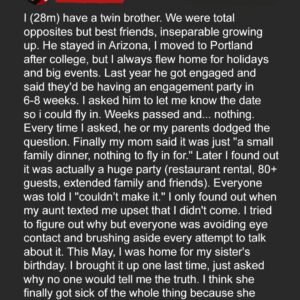Jess used to believe marriage was about balance — give and take, understanding, compromise. She repeated those words during her vows, and clung to them through the hard years when exhaustion became routine. But somewhere along the way, that balance disappeared. Or maybe, Jess realized, Jason never truly understood it in the first place. Six years into their marriage, Jess was running herself into the ground. She worked grueling 12-hour shifts at the hospital, helping patients through emergencies and grief, only to return home to another kind of shift — cooking, cleaning, managing three children, including an infant who still woke her up multiple times a night.
Meanwhile, Jason had been laid off for months. What started as a temporary break turned into long days of scrolling through job boards and excuses. He called it “waiting for the right opportunity,” but Jess only saw him sitting on the couch while her body broke down from the weight of it all. The tension finally exploded during his mother Ruth’s birthday dinner — a big family gathering filled with warmth, noise, and home-cooked food. As everyone laughed and shared stories, Jason’s brother Leo proudly announced that his wife, Chrissy, had started Zumba classes — and even danced for him every night.
Laughter erupted. Chrissy giggled, and Leo puffed up with pride. But Jess just sat there silently, her tired body aching, her heart sinking. Then, without warning, Jason slammed down his fork and loudly asked Jess why she didn’t dance for him like Chrissy did for Leo. His voice cut through the room like a knife. Then he said the unthinkable: “If you don’t start giving me what I need, maybe I’ll find it somewhere else.” The room went silent. Jess froze, stunned by the humiliation. She looked around at the shocked faces, then back at her husband, realizing he meant every word. So she calmly put her fork down and told him the truth. That she was holding the family together, working herself to the bone, while he contributed nothing.

That if she didn’t have the energy to dance for him, it was because she was too busy keeping everything — and everyone — afloat. Her words hit the table like thunder. Jason went pale and stormed outside. Later that night, still fuming and hurt, Jess followed him outside to confront him. But Jason, rather than apologizing, accused her of embarrassing him. He told her she should’ve laughed off his comment, or played along. Jess couldn’t believe what she was hearing. She reminded him that he had embarrassed her, not just with the comment, but with the months of neglect and entitlement leading up to it.
That night ended in silence. But a message arrived at midnight — from Ruth. “Good on you for calling him out,” it read. “I’m embarrassed by what he said. Want my help teaching him a real lesson?” Jess, surprised but intrigued, agreed to hear more. Ruth had a plan. Two nights later, Jess set the stage at home — dimmed lights, soft music — pretending to give Jason what he had so publicly demanded. Jason was thrilled, already imagining himself bragging to his brothers. But just as Jess was about to begin, Ruth entered the house unannounced.

Jason froze in shock. Ruth calmly sat down and told Jess to continue — “Don’t stop on my account.” Then she turned to her son. “You wanted your wife to dance for you? Go on, let’s see the kind of man I raised.” Jason was mortified. Ruth didn’t hold back. She reminded him that Jess worked long hours to support the family, raised the kids, and still kept the house running — all while he did nothing. She told him he’d disrespected his wife, his marriage, and himself. She made it clear: what he had done wasn’t funny, it was disgraceful.
Jason stood there pale and speechless. That night, he didn’t say much. But the next morning, something shifted. He quietly admitted he had been wrong. Not just about the dinner, but about everything. In the weeks that followed, Jess saw small but meaningful changes. Jason began helping around the house — folding laundry, cooking (badly), taking care of the kids. He never brought up the “dancing” again. If anything, the memory seemed to embarrass him deeply. It wasn’t a total transformation — he was still Jason — but for the first time, he was trying.
For Jess, something had changed too. After years of feeling invisible, dismissed, and unappreciated, she finally felt seen. Their marriage wasn’t magically fixed, but it was real again — no longer built on assumptions or demands, but on mutual effort and a long-overdue understanding of what partnership really means.
Jess used to believe marriage was about balance — give and take, understanding, compromise. She repeated those words during her vows, and clung to them through the hard years when exhaustion became routine. But somewhere along the way, that balance disappeared. Or maybe, Jess realized, Jason never truly understood it in the first place. Six years into their marriage, Jess was running herself into the ground. She worked grueling 12-hour shifts at the hospital, helping patients through emergencies and grief, only to return home to another kind of shift — cooking, cleaning, managing three children, including an infant who still woke her up multiple times a night.
Meanwhile, Jason had been laid off for months. What started as a temporary break turned into long days of scrolling through job boards and excuses. He called it “waiting for the right opportunity,” but Jess only saw him sitting on the couch while her body broke down from the weight of it all. The tension finally exploded during his mother Ruth’s birthday dinner — a big family gathering filled with warmth, noise, and home-cooked food. As everyone laughed and shared stories, Jason’s brother Leo proudly announced that his wife, Chrissy, had started Zumba classes — and even danced for him every night.
Laughter erupted. Chrissy giggled, and Leo puffed up with pride. But Jess just sat there silently, her tired body aching, her heart sinking. Then, without warning, Jason slammed down his fork and loudly asked Jess why she didn’t dance for him like Chrissy did for Leo. His voice cut through the room like a knife. Then he said the unthinkable: “If you don’t start giving me what I need, maybe I’ll find it somewhere else.” The room went silent. Jess froze, stunned by the humiliation. She looked around at the shocked faces, then back at her husband, realizing he meant every word. So she calmly put her fork down and told him the truth. That she was holding the family together, working herself to the bone, while he contributed nothing.

That if she didn’t have the energy to dance for him, it was because she was too busy keeping everything — and everyone — afloat. Her words hit the table like thunder. Jason went pale and stormed outside. Later that night, still fuming and hurt, Jess followed him outside to confront him. But Jason, rather than apologizing, accused her of embarrassing him. He told her she should’ve laughed off his comment, or played along. Jess couldn’t believe what she was hearing. She reminded him that he had embarrassed her, not just with the comment, but with the months of neglect and entitlement leading up to it.
That night ended in silence. But a message arrived at midnight — from Ruth. “Good on you for calling him out,” it read. “I’m embarrassed by what he said. Want my help teaching him a real lesson?” Jess, surprised but intrigued, agreed to hear more. Ruth had a plan. Two nights later, Jess set the stage at home — dimmed lights, soft music — pretending to give Jason what he had so publicly demanded. Jason was thrilled, already imagining himself bragging to his brothers. But just as Jess was about to begin, Ruth entered the house unannounced.

Jason froze in shock. Ruth calmly sat down and told Jess to continue — “Don’t stop on my account.” Then she turned to her son. “You wanted your wife to dance for you? Go on, let’s see the kind of man I raised.” Jason was mortified. Ruth didn’t hold back. She reminded him that Jess worked long hours to support the family, raised the kids, and still kept the house running — all while he did nothing. She told him he’d disrespected his wife, his marriage, and himself. She made it clear: what he had done wasn’t funny, it was disgraceful.
Jason stood there pale and speechless. That night, he didn’t say much. But the next morning, something shifted. He quietly admitted he had been wrong. Not just about the dinner, but about everything. In the weeks that followed, Jess saw small but meaningful changes. Jason began helping around the house — folding laundry, cooking (badly), taking care of the kids. He never brought up the “dancing” again. If anything, the memory seemed to embarrass him deeply. It wasn’t a total transformation — he was still Jason — but for the first time, he was trying.
For Jess, something had changed too. After years of feeling invisible, dismissed, and unappreciated, she finally felt seen. Their marriage wasn’t magically fixed, but it was real again — no longer built on assumptions or demands, but on mutual effort and a long-overdue understanding of what partnership really means.





